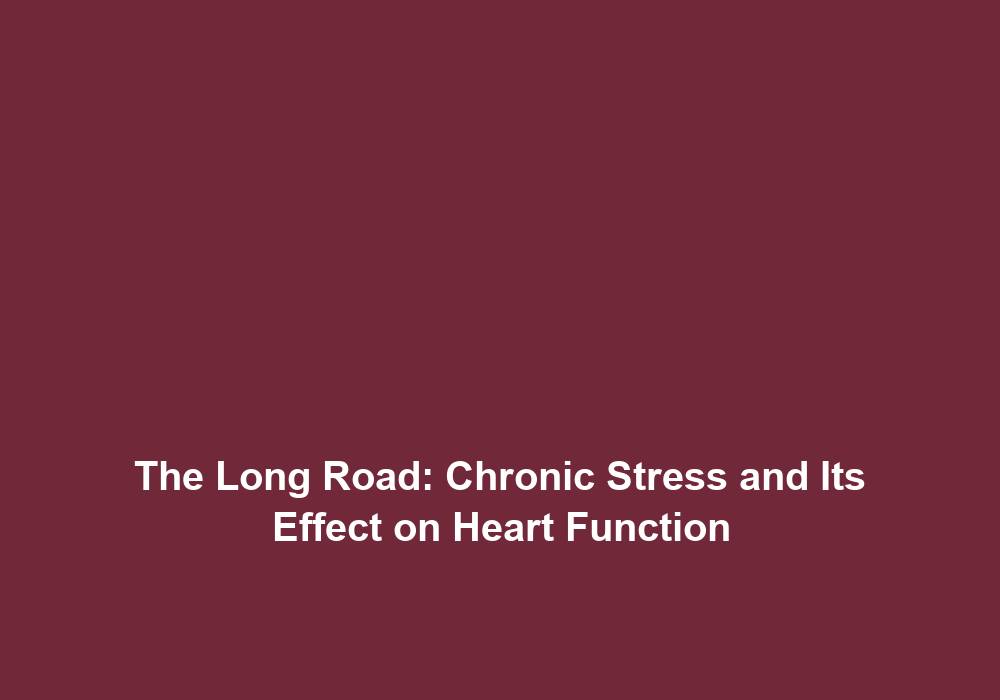The Long Road: Chronic Stress and Its Effect on Heart Function
Chronic stress has become an increasingly prevalent issue in today’s fast-paced society. The constant pressure and demands we face on a daily basis can take a toll on our overall well-being, particularly on our heart health. In this article, we will delve into the connection between chronic stress and its effects on heart function, shedding light on the importance of stress management for a healthy cardiovascular system.
Understanding Chronic Stress
Before we explore the impact of chronic stress on heart function, it is essential to comprehend what chronic stress actually entails. Unlike acute stress, which is a short-term response to a specific event, chronic stress refers to a prolonged and continuous state of stress. It can stem from various sources such as work-related pressures, financial difficulties, relationship problems, or even ongoing health issues.
Chronic stress can have a profound impact on our physical and mental health. It can disrupt the balance of hormones in our body, leading to long-lasting physiological changes. The prolonged activation of the stress response can result in increased heart rate, elevated blood pressure, and a higher risk of developing cardiovascular diseases.
The Role of Stress Hormones
When we experience stress, our bodies release stress hormones, primarily cortisol and adrenaline, as part of the body’s natural fight-or-flight response. These hormones increase heart rate and blood pressure temporarily, redirecting blood flow to vital organs and muscles.
However, when stress becomes chronic, the constant elevation of stress hormones can have detrimental effects on the cardiovascular system. Prolonged exposure to stress hormones can lead to persistent high blood pressure, an increased risk of heart disease, and even cardiac events such as heart attacks.
Chronic stress not only affects the heart directly through the release of stress hormones but also indirectly by influencing other risk factors for heart disease. For example, stress can contribute to unhealthy lifestyle choices, such as overeating or smoking, which further increase the risk of developing heart problems.
Impact on Blood Pressure
One of the prominent effects of chronic stress on heart function is the elevation of blood pressure. The continuous release of stress hormones can cause the blood vessels to constrict and narrow, leading to hypertension.
High blood pressure forces the heart to work harder to pump blood throughout the body, placing an excessive strain on the heart muscles. Over time, this can result in the thickening of the heart walls, a condition known as left ventricular hypertrophy. Ultimately, this can weaken the heart and increase the likelihood of heart failure.
In addition to the physical effects, chronic stress can also contribute to the development of unhealthy coping mechanisms, such as emotional eating or excessive alcohol consumption, which can further elevate blood pressure and contribute to heart problems.
Inflammation and the Immune System
Chronic stress also has a profound impact on the immune system and can trigger an inflammatory response in the body. Inflammation plays a significant role in the development of cardiovascular diseases, including atherosclerosis, a condition characterized by the buildup of plaque in the arteries.
When the body is continuously under stress, the immune system may become dysregulated, leading to chronic low-grade inflammation. This persistent inflammation can damage the inner lining of the blood vessels, promoting the formation of plaque and increasing the risk of coronary artery disease.
It is important to note that inflammation is a complex process influenced by various factors, including genetics, diet, and lifestyle. Chronic stress can exacerbate this inflammatory response, further contributing to the development and progression of heart disease.
Stress and Unhealthy Coping Mechanisms
In addition to the physiological effects, chronic stress often leads individuals to adopt unhealthy coping mechanisms, such as overeating, smoking, excessive alcohol consumption, or a sedentary lifestyle. These behaviors can further compound the detrimental effects on heart health.
Poor dietary choices and excessive calorie intake can contribute to weight gain, obesity, and the development of conditions like diabetes and high cholesterol. Smoking and excessive alcohol consumption are well-known risk factors for cardiovascular diseases, including heart attacks and strokes. Lack of physical activity can also contribute to weight gain and further increase the risk of heart problems.
It is crucial to recognize these unhealthy coping mechanisms and make conscious efforts to replace them with healthier alternatives. Engaging in stress-relieving activities like exercise, meditation, or spending time in nature can provide healthier outlets for managing stress and protecting heart health.
Strategies for Managing Chronic Stress
Given the significant impact of chronic stress on heart function, it is crucial to implement effective stress-management strategies. Here are some practical techniques to help mitigate the negative effects of chronic stress:
-
Exercise regularly: Engaging in physical activity releases endorphins, which are natural mood boosters. Regular exercise can help reduce stress levels, improve cardiovascular health, and promote overall well-being. Aim for at least 150 minutes of moderate-intensity exercise per week.
-
Practice relaxation techniques: Techniques such as deep breathing exercises, meditation, and yoga can help activate the body’s relaxation response, thereby reducing stress levels and promoting heart health. Set aside dedicated time each day to practice these techniques and incorporate them into your daily routine.
-
Establish a support system: Surrounding yourself with a supportive network of friends and family can provide emotional assistance during challenging times. Sharing concerns and seeking advice can help alleviate stress and promote a sense of well-being. Cultivate meaningful relationships and prioritize spending time with loved ones.
-
Prioritize self-care: Taking time for oneself is crucial in managing stress. Engage in activities you enjoy, such as hobbies, reading, or spending time in nature. Self-care activities can help reduce stress levels and improve overall mental and physical health. Set aside regular time for self-care and make it a non-negotiable part of your routine.
-
Seek professional help: If chronic stress becomes overwhelming and starts to significantly impact your daily life, do not hesitate to seek help from a mental health professional. They can provide guidance, support, and specialized strategies to cope with chronic stress effectively. Reach out to a therapist or counselor who specializes in stress management and make use of their expertise.
By implementing these strategies, you can take proactive steps to manage chronic stress and protect your heart health. Remember, stress management is a lifelong journey, and it requires consistent effort and self-care.
Conclusion
Chronic stress poses a significant threat to our heart health and overall well-being. The consistent release of stress hormones, elevated blood pressure, inflammation, and unhealthy coping mechanisms can all contribute to the development of cardiovascular diseases.
Understanding the impact of chronic stress on heart function highlights the need for effective stress management techniques. By incorporating regular exercise, relaxation techniques, building a support system, prioritizing self-care, and seeking professional help when necessary, we can take proactive steps to protect our hearts and lead healthier, stress-free lives. Embracing a holistic approach to stress management is key in maintaining a healthy cardiovascular system and improving our overall quality of life.







